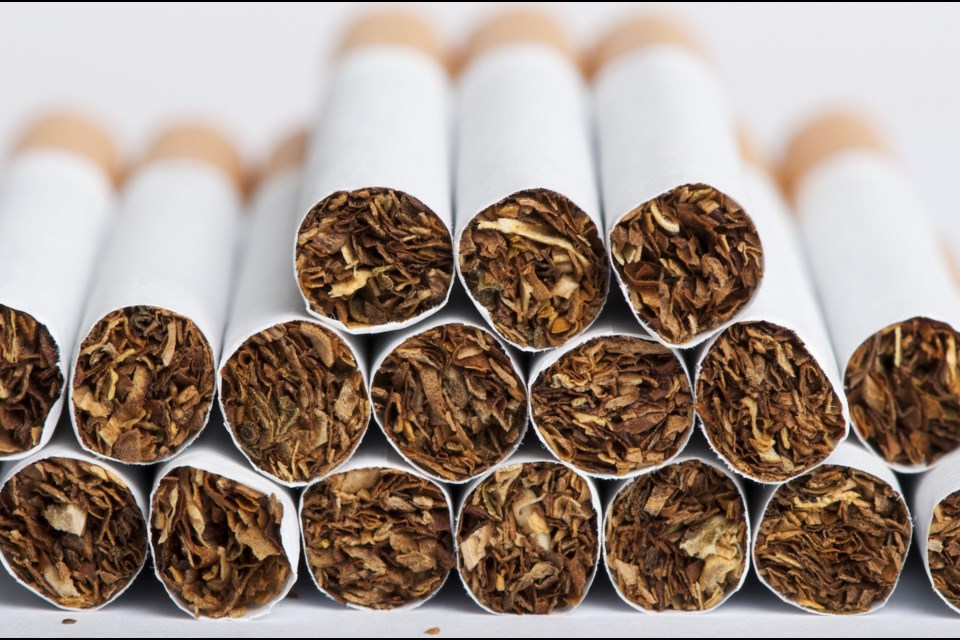THUNDER BAY — A national group that's working to counteract the contraband tobacco trade says up to half the cigarettes smoked in Thunder Bay are illegal.
The National Coalition Against Contraband Tobacco (NCACT) also says Ontario is the epicentre of the problem in Canada, with the second-highest rate of contraband tobacco consumption in the western hemisphere.
NCACT says this costs the provincial government $750 million annually in taxes.
Retired police officer Ron Bell is the group's law enforcement advisor.
Bell said illegal cigarettes hurt all taxpayers because of the lost revenue, but are also dangerous because they may be produced without appropriate quality controls.
He's holding virtual meetings this week with leaders in impacted communities across the province to discuss how the problem might be dealt with.
According to Bell, estimates of the penetration of contraband tobacco into specific markets such as Thunder Bay are done, in part, with a "butt study."
People are hired to retrieve the cigarette butts left by groups of smokers, and "you can identify the manufacturer based on the markings on the filter and the tube," Bell said.
He said most of the illegal cigarettes entering the Thunder Bay market originate in southwestern Ontario.
Earlier this year, Ontario Provincial Police arrested 18 people and seized over 11 million cigarettes in connection with an allegedly illegal tobacco manufacturing facility on Six Nations territory.
OPP said the group controlling the facility was from the Greater Toronto Area, and was connected to organized crime.
Bell said the OPP does a good job locating illegal tobacco shipments on the highway, including Highway 17 through Northwestern Ontario.
"They work. They know what they're looking for. There's officers in that pipeline between Thunder Bay and Manitoba. There's been some amazing arrests and seizures there."
But the National Coalition Against Contraband Tobacco says Ontario needs to do much more, including educating consumers about the harmful effects of the trade in illegal cigarettes.
"As a former policeman myself, police don't want to charge grandma and grandpa who have taken their Sunday drive and have bought their one carton of cigarettes. You could do that all day. There has to be a will to get the 100 cases, the 500 cases, the semi trucks that are transporting the cigarettes, the stores that are selling them," Bell said.
Legitimate businesses, he said, can't compete with outlets that sell cigarettes for less than half the price.
Bell feels Ontario could learn from Quebec, which established a dedicated 50-person police unit to combat the problem, and set up a fund for local police services to help pay the cost of their tobacco investigations.
Quebec police don't enter communities to make tobacco busts, but once a shipment gets on a truck, their approach is "to find it and get it," he said.
Bell also offered one other caution about illegal cigarettes, saying they pose a worse fire hazard than legal tobacco.
They have been linked to serious house fires, including several fatal blazes In London, Ontario.
After two fires in 2018, London's deputy fire chief warned that illegal smokes don’t have the same safety features as store-bought ones.
“A store-bought cigarette has three bands of paper and it’s less porous, so it doesn’t allow the air...into the burning materials, which causes the cigarette to self-extinguish. We don’t have that in contraband cigarettes, so the cigarettes literally free-burn right down to the filter,” Jack Burt told local news media.
NCACT says its members include businesses, law and order organizations, and individuals.
A significant portion of its funding comes from the Canadian Tobacco Manufacturers Council, which represents Rothmans, Benson & Hedges Inc; Imperial Tobacco; and JTI-Macdonald Corp.
